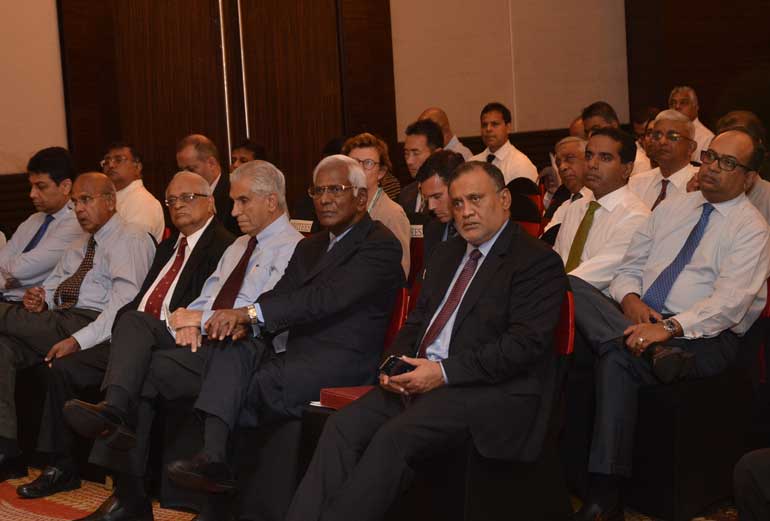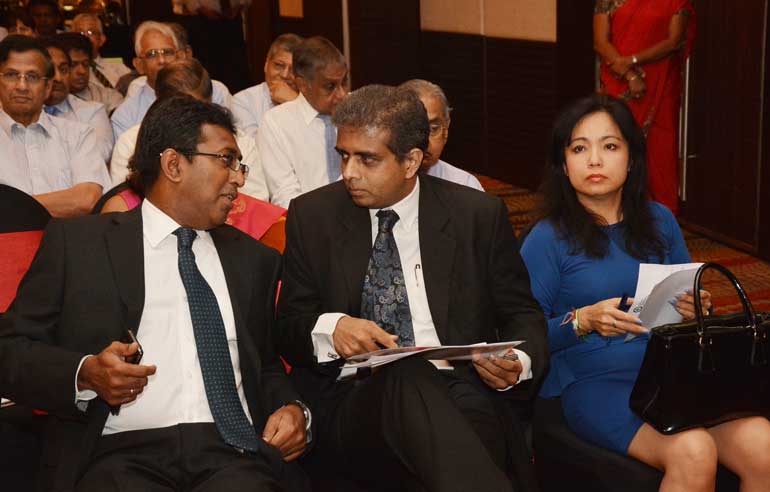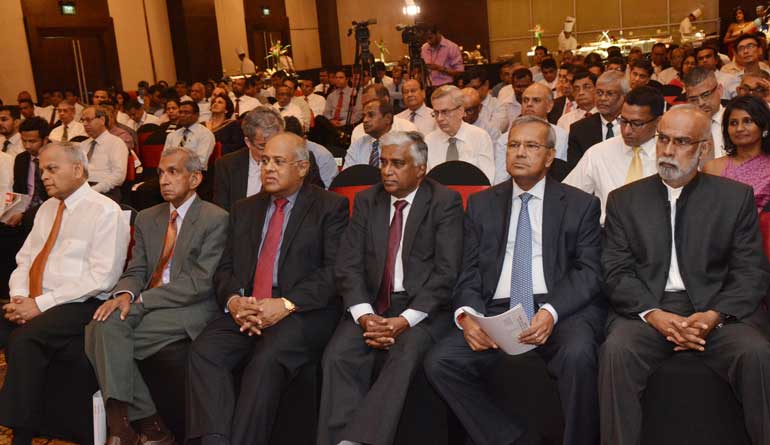Thursday Feb 26, 2026
Thursday Feb 26, 2026
Thursday, 2 July 2015 00:00 - - {{hitsCtrl.values.hits}}

Northern Province Governor
H.M.G.S. Palihakkara
By Channa Fernandopulle
Northern Province Governor H.M.G.S. Palihakkara called on the private sector to capitalise on investment opportunities in the north while issuing a pointed criticism on the lack of true reconciliation six years into post-conflict development.
Delivering an address at the 176th Annual General Meeting of the Ceylon Chamber of Commerce (CCC). He said: “The very fact that we are constrained to talk about conflict related challenges more than six years after ending the conflict is in itself a matter of some concern. It is clear that successive Governments and the political leadership on all sides have failed to fully grasp – and I must emphasise fully – the opportunity for post conflict peace building presented by the cessation of hostilities.”
“Community leaders and civil society of course need to introspect as well whether they have done enough and so must you the corporate leaders. As we enter the latter part of the post-conflict decade we should surely have seen a process of accommodation and reconciliation taking place however this does not seem to be the case. The media headlines every morning tell a different and disturbing story,” he warned.
Acknowledging the fact that some positive steps had been taken in terms of development, Palihakkara observed that interested parties are nevertheless actively working to accentuate differences and nurturing polarisation between communities thereby naturally undermining efforts to reconcile.
“Despite the advocacy of the important principles of national unity, good governance and broad-based decision making by the post-January Government, consensual approaches to national issues are still struggling to take root in important decision making be it in the Legislature or in the realm of Executive action.
“Even when there is apparent agreement and massive public support for certain progressive measures, consensus today has become a rather painful, slow and frustrating exercise; a case in point being of course the story behind 19A and 20A,” he noted.
Palihakkara added that such petty bickering in the political sphere would spill over into the realm of business, both at a company level and on the wider macroeconomic stage while adversely impacting the management of issues of national significance.
“Parochial electoral politics continue to dictate fate of national institutions. It has been and continues to be a problem. Issues of national importance such as devolution, a bipartisan approach to foreign policy and economic policy, institution building, human rights, post-conflict peace building and many more have yet to be liberated from actual election politics.
“Convoluted interpretations of these issues have become the norm of the election campaign of most parties and most of those are whom we euphemistically call leaders; all of which undermines the predictability of the system and as you well know also impairs investor confidence,” he said.
He added that the absence of a structured dialogue on issues of devolution, governance and reform between of ethnic communities and political parties had compounded challenges facing moderates.
“This is of course not a situation that is conducive to reconciliation and peace-building nor will it spur economic growth based on more FDIs, more exports and more people to people contact. This is troubling at a time when the economic gearbox is poised to shift from a politically expedient but debt driven growth scenario to a more sustainable, investment driven growth scenario,” he cautioned.
Shifting his focus to the thorny issue of human rights and foreign policy, Palihakkara charged that a Government that is committed to protecting human rights would by default have no need to defend its human rights track record and in that context, called for a strengthening of domestic mechanisms in order to prevent “human rights issues from becoming foreign policy issues” and called on the Government and political leaders to adopt a consensual approach capable of generating viable solutions ahead of Geneva sessions in September.
“The country cannot afford to let this sensitive issue drift into the political logjam of the election campaign, otherwise non-economic factors like human rights will continue to hinder the maximisation of business opportunities to the country. There is only one way of addressing this challenge: Follow our constitution. Its chapter on fundamental rights encapsulates both a simple idea and a profound truth.
“The simple idea is that the Government’s job is not to defend its human rights record but to defend human rights. When you have such a proactive stance on human rights you don’t have to be defensive about it. This ought to be the basis for governance and foreign policy,” Palihakkara stated.
However he conceded that such action would likely only be possible subsequent to general elections which have been announced for 17 August.
Attacking the island’s political elite for disregarding the mandate of the people following January’s elections, he said: “Voter support for reform and change was clear and present during the last presidential election. That sentiment transcended ethnic groups and political parties as well as other key players in the north and south but this has not been transformed into broad-based politics and programs promoting harmony and accommodation through consensual approaches.
“Northern and southern politicians continue to wallow in countervailing utterances, unhelpful polemics and spite, whereas a more co-operative arrangement is the need of the hour. Instead of such a constructive dialogue it is unfortunate that combative monologues continue to mushroom around us.”
He emphasised that such trends had to be reversed in favour of productive dialogue at all levels in order to engage a wide group of stakeholders noting that no single approach favoured by one party to reconciliation would be viable or desirable.
“The troubling reality has always been that the ethnic issue will be abused by politicians on all sides – whether in the north or south. The unfolding election campaign does not suggest that it will be different this time either.
“The biggest challenge therefore would be history repeating itself. The promise of reform, reconciliation and progress brought about by the last presidential election should not become another missed opportunity. Our history is of course littered with such missed opportunities and therefore we cannot fault the pessimists too much, for saying that the present window of opportunity may not stay open for long unless the forthcoming election puts it right,” he stated.
In spite of such challenges, the Northern Province Governor issued a rallying call to Sri Lanka’s private sector, civil society and wider citizenry to disregard political pitfalls in order to join hands and move towards a brighter future.
In that context he stated that a strong emphasis would have to be placed on improving stagnating socio-economic conditions in the north and east while addressing human rights issues and post-conflict trauma endured by Sri Lankans in former warzones.
“Although some excellent work has been done on infrastructure in the north and east, these projects alone cannot achieve enough in terms of advancing household income, addressing livelihood needs and creating an atmosphere of confidence that normalisation is taking place. Other social concerns like alcoholism, drugs abuse, and criminal violence are on the rise, particularly in the north. It is therefore an urgent priority that all stakeholders – and here the private sector has a significant role to play – must inject further investment, , value addition and capacity into those areas,” Palihakkara urged.
Noting that the Northern Province’s share of the GDP had stayed persistently low at 3.4% and 3.6% in 2010 and 2013 respectively while average household incomes in the province remained well below national averages and investments scarce, he reiterated the need to focus in particular on Small and Medium Enterprises (SME), co-operative societies and value addition in the agriculture and fisheries sectors.
In that context, Palihakkara commended the present Government’s efforts to reconnect with Sri Lankan expatriates and stated that their skills, expertise and investments could play a pivotal role in truly putting the Sri Lankan economy back on track.
“If we address existential issues of the people and hasten the development process, we diminish room for political mischief making by divisive forces,” he added.
Palihakkara pointed to further potential investment opportunities in numerous sectors including waste disposal, recycling, construction, healthcare, hospitality, trade and vocational training while noting that such investments could easily take place without having to rely on the creation of new legislative and policy frameworks from Government.
He added that Jaffna’s network of ferries was in desperate need of upgrade and expansion as inadequate ferry capacity had the impact of retarding growth, particular among island regions.
Commenting on the paucity of investment in the north, he observed that with the exception of certain investments in garment manufacture and significant investments in power and energy, the north remained largely ignored in terms of private sector investment.
He stated that of the approximately Rs. 20 billion of investments directed to the region, the majority – approximately Rs. 13 billion – had been directed towards the construction of power plants with the remainder being directed into garment manufacture and hospitality.
“This is a figure that we can and surely must improve on, especially in order to invest in value addition. This is a deficit that needs to be filled both in terms of promoting north-south understanding but also exploiting prudent economic opportunities for corporate leaders,” Palihakkara stated.
In that context, he commended the Government for accepting a proposal from himself and Northern Province Chief Minister C.V. Wigneswaran to hold the National Sports Festival in the north, noting that such measures could help to bridge the divide between the north and south while potentially serving as a catalyst for private sector involvement in the province.
Palihakkara went on to call for the establishment of a continuous dialogue between business and trade chambers in the north and south and Sri Lankan expatriates in order to facilitate a greater flow of investments and know-how.
“The chambers must be proactive drivers of such measures and not merely onlookers. Such a proactive approach can generate several positive synergies while diverting the energies of the diaspora that is talked about so much these days from hostile politics to positive economic growth.
“That will enhance household incomes in the north and business for Sri Lanka in general. It will also provide a useful interface for the Government’s new policy of engagement with expatriates while ensuring that the real life economic impact of such development is felt at the level of the households and the grass roots level while pooling the resources of the Central Government, the northern intuitions and provincial councils and the corporate sector,” he suggested.
Noting that such capacity building and investment was sorely needed in the north and east, he concluded his remarks with an open invitation to all interested private sector and civil society organisations to work with his office and that of the Northern Provincial Council towards greater economic development and reconciliation.



Pix by Upul Abayasekara